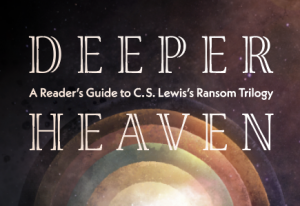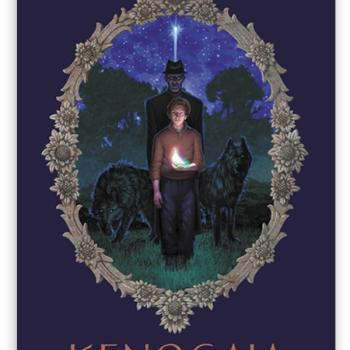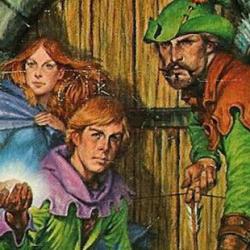
As “science fiction” stories go, C.S. Lewis’s Space Trilogy—Out of the Silent Planet, Perelandra, and That Hideous Strength—is a curious beast. The books don’t really follow genre norms—or even traditional narrative conventions—in any obvious way. Lewis’s characters have a propensity to deliver exposition dumps thick with biblical and medieval allusions, and (with the noted exception of the final volume), the volumes’ climaxes are understated affairs. And on the surface, the project as a whole seems to lack thematic continuity: the final installment, That Hideous Strength, eschews its predecessors’ otherworldly landscapes in favor of decidedly terrestrial bureaucratic dealings, and relegates Elwin Ransom (protagonist of the first two volumes) to the sidelines for most of the book.
Nevertheless, when I first read the trilogy as a ten- or eleven-year old, I was captivated. Though I certainly didn’t have the literary or metaphysical background to pick up everything Lewis was doing, I found the imagery compelling and the themes resonant. To this day, I don’t remember many of the details of Frank Herbert’s Dune or Isaac Asimov’s The Caves of Steel, but so many moments of the Space Trilogy—Ransom’s first encounter with the Yeti-like sorns on Mars, his battle with a demonically possessed “Un-man” in alien caverns, the bloody rampage of wild beasts that caps off That Hideous Strength—are etched deep into my imagination.
For those readers longing to go “further up and further in,” Christiana Hale’s new book Deeper Heaven: A Reader’s Guide to C.S. Lewis’s Ransom Trilogy sets out to demystify Lewis’s epic, offering up a wide-ranging exploration of the trilogy’s complex inner workings. What’s more, Deeper Heaven is a profoundly accessible text that nonacademic readers will be able to appreciate: Lewis’s work is dense indeed, but Hale’s prose is mercifully unclouded by excessive jargon.
As Hale explains, the foundation of the Space Trilogy is the Ptolemaic cosmology that dominated the medieval period: a universe with the earth at its center, surrounded by concentric spheres of unfallen majesty and glory, leading ever “upward” to the empyrean where God dwells. On this view of the world, the creation as a whole was not necessarily scarred by Adam and Eve’s sin in Eden; any intelligent creatures residing in other spheres (Jupiter, say, or Saturn) likely remain as yet untainted by sin. In the first two books of the trilogy, Lewis’s hero Ransom travels first to Mars (“Malacandra”) and then to Venus (“Perelandra”) where he learns to discern the principles of cosmic order and battles fellow human spacefarers who harbor malign intent; in the third book, Ransom leads humans and extraterrestrial powers alike against an evil organization seeking to deconstruct the human species.
Lewis’s larger goal, Hale argues, was to inspire his readers to think of the starry skies above as not merely “space” but rather, as in olden days, “the heavens.” (Hence Hale’s preference for the moniker “Ransom Trilogy” over “Space Trilogy.”) This reconceptualization, in Lewis’s mind, ought to amount to what philosopher of science Thomas Kuhn might describe as a paradigm shift, a challenging of fundamental assumptions about the world upon which our theoretical reasoning is built: if we could see the world as ordered and harmonious and alive rather than silent and stochastic, wouldn’t our lives be transformed?
In making this case, Deeper Heaven builds on the pioneering work of Michael Ward, who argued in Planet Narnia: The Seven Heavens in the Imagination of C.S. Lewis that each of the seven Chronicles of Narnia books intentionally evokes the mood or sensibility associated with one of the seven heavenly spheres of old. The Lion, the Witch, and the Wardrobe is a story about the restoration of kingship and the defeat of evil, ideas associated with Jupiter, or Jove; Prince Caspian is fierce and militant, evoking the warlike essence of Mars; and so on. Naturally there’s a great deal of conceptual overlap here, so much so that Deeper Heaven is likely to be appreciated most by readers not only already familiar with both the Space Trilogy and the Chronicles, but also Ward’s larger argument.
That being said, Hale doesn’t follow Ward’s approach of laying out a single overarching interpretation, instead preferring to proceed by way of a collection of interrelated observations about aspects of the trilogy. These individual discussions include an exploration of recurrent word usages (a particular high point of the volume is Hale’s analysis of the etymology of words like “tingling” and “consider” that figure prominently in the trilogy—she makes a compelling argument that these choices were deliberate, thematically-minded moves by Lewis), the trilogy’s treatment of gender relations, the metaphysical status of Merlin in the trilogy, and so forth.
Perhaps the most striking and important of these observations is Hale’s comparison of the trilogy to Dante’s Divine Comedy. As a medievalist, Lewis himself was thoroughly steeped in the iconography and language of the great epic, and his trilogy is shot through with parallels. To name but a few: Ransom is a wayfarer, midway upon the journey of his life, that finds himself swept up in a vast metaphysical voyage; the powers and principalities of various domains deliver lengthy orations explaining the logic of the universe; Perelandra culminates in a scene that clearly evokes the Earthly Paradise described at the end of Purgatorio; and so on.
But there are crucial differences, too. Lewis’s trilogy proceeds from the “outside in” (going from the distant Mars to the nearer Venus, and then to Earth itself) rather than the upward ascent of Dante’s pilgrim from Hell to Heaven. And while Hale doesn’t come right out and say so, it seems to me that Lewis actually inverts the whole structure of the Comedy: Ransom begins his odyssey on the unfallen Mars (Paradiso), progresses to a Venus caught up in tension between divine and malign forces (Purgatorio), and finally descends into the bowels of human corruption (Inferno). In any case, it’s a fascinating comparison that’s reminiscent of Planet Narnia in the best of ways.
As absorbing as it is, though, there are a number of areas where Deeper Heaven could go further than it does. For one thing, the book suffers at times from what feels like a thin conceptual vocabulary for describing some of the trilogy’s bigger-picture themes. To name just one example, at one point the book excerpts Lewis’s description of the villainous Weston’s philosophy of life:
The majestic spectacle of this blind, inarticulate purposiveness thrusting its way upward and ever upward in an endless unity of differentiated achievements towards an ever-increasing complexity of organization, towards spontaneity and spirituality, swept away all my old conception of a duty to Man as such. Man in himself is nothing. The forward movement of Life—the growing spirituality—is everything. . . . To spread spirituality, not to spread the human race, is henceforth my mission. This sets the coping-stone on my career. I worked first for myself; then for science; then for humanity; but now at last for Spirit itself—I might say, borrowing language which will be more familiar to you, the Holy Spirit.
This strikes me as pretty clearly a swipe at Hegelian interpretations of history, which theorized an immanent working-out of the divine plan through the syntheses of the world-historical process. Indeed, Lewis could hardly be more explicit: at the heart of Hegel’s metaphysics was the concept of Absolute Spirit (Geist), and that seems to be the same principle to which Weston claims allegiance. But Hale doesn’t really pick up on this, instead treating Weston’s ideology simply as an undifferentiated rival to Christian theism. That may be true, but the point is subtler than that (Hegel understood himself, for one thing, as a genuinely Christian philosopher) and a little more elucidation of this issue, I think, would do better justice to Lewis’s theme.
Additionally, for a book that seeks (at least in part) to help rehabilitate a premodern approach to the cosmos, it’s very surprising that there’s next to no treatment of the concept of sacramentality—of the eternal reality “beyond the spheres” being made present in the midst of the temporal. Arguably this is implicit in many of Hale’s arguments, but I waited in vain for a more thoroughgoing treatment of how this motif plays out in the trilogy (notably, Ward touches on this theme in Planet Narnia).
Finally—and perhaps most notably, given the omnipresence of the subject in contemporary culture—Hale has very little to say about the trilogy’s treatment of sexuality qua sexuality. And yet this was a theme Lewis was not shy about addressing in his writings for adults, including within the Space Trilogy itself. The protagonists of Perelandra spend most of the novel in the nude, but without the specter of disordered desire. The villainous N.I.C.E. in That Hideous Strength is suffused with elements of sexual threat. And finally there is Ransom’s haunting description of the depths to which the alien inhabitants of Sulva, the Moon, have sunk: “There dwell an accursed people, full of pride and lust. There when a young man takes a maiden in marriage they do not lie together, but each lies with a cunningly fashioned image of the other . . . . Their real children they fabricate by vile arts in a secret place.” In a world where OnlyFans and Sophie Lewis’s Full Surrogacy Now make news headlines, Lewis’s nightmare worlds seem sickeningly prescient.
I realize, though, that no analysis of this series could ever hope to do it complete justice—and Hale’s book certainly made me want to revisit the trilogy itself after all these years. To my mind, Deeper Heaven is exactly the sort of volume that literary-minded Christians should be writing. And more of them should be doing so: I have to admit that students from the New Saint Andrews College orbit (such as Hale and Jonathan McIntosh, author of The Flame Imperishable: Tolkien, St. Thomas, and the Metaphysics of Faerie) have been doing some of the most interesting scholarly work on beloved Christian authors that I’ve come across in the last few years, and I hope my own alma mater starts producing authors this adept.
Suffice it to say that if (like me) you read the Space Trilogy long ago and wondered exactly how many things you were missing, Hale’s book should prove an invaluable lodestar.












